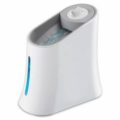
People with allergies and sensitive skin often also suffer from eczema, which causes dry, itchy and irritated skin. Eczema, also called atopic dermatitis, is often exacerbated by cold, dry winter weather. It's important to treat eczema, because scratching sensitive skin can lead to infections and further irritation.
Here are some ways you can minimize your eczema symptoms:
- Avoid irritants: Do your best to stay away from known allergens, such as perfumes, detergents or soaps that have irritated your skin in the past.
- Humidify: Your home heating system keeps you nice and toasty through the winter months, but it also dries out the air and makes your eczema worse. To battle this, use a humidifier to put moisture back into the air. The ideal humidity level is 45 to 55 percent. Just make sure to keep your humidifier clean so it doesn't grow mold.
- Moisturize: Apply a thick moisturizer to your skin twice daily, especially after getting out of the shower. This will help your body lock in the moisture it's missing. Also make sure to take shorter showers and use warm, but not hot, water. Don't use harsh soaps or fragrances, either, because these could be irritating your body.
- Protect: Protecting your eczema-prone skin is crucial. Harsh temperatures make the condition worse, so be sure to wear gloves outside and apply sunscreen if you're going to be outside for a prolonged amount of time.
There's no cure for eczema, but with proper management your skin can stay happy even through the coldest and driest winter months. Contact Allergy Be Gone if you have other questions about allergy control or allergy control products.









